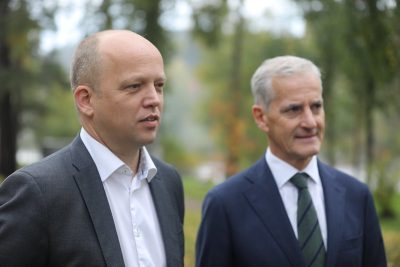Prime Minister Jonas Gahr Støre and his finance minister, Trygve Slagsvold Vedum, have been warning about tough times ahead for months. Now the public seems to be warning them: Another new poll has given opposition parties a solid majority in Parliament, while 42 percent of Norwegians think Støre is doing a poor job.

The latest poll results come just as Vedum prepared to unveil the left-center government’s first state budget with lots of controversial tax proposals. It’s disheartening news for both Vedum and Støre, who’ve both been grappling with one crisis after another since winning last autumn’s election. Russia’s war on Ukraine and resulting energy crisis have botched up most of their plans, and forced changes in both their government platform and their proposed state budget.
There’s no question their voters are deserting them, even before Vedum presented a state budget expected to be full of disappointments. The new public opinion poll, conducted by research firm Norstat for state broadcaster NRK and newspaper Aftenposten, has once again left Støre’s Labour Party with less than 20 percent of the vote. That’s 0.3 points higher than Labour’s last poll of 19.6 percent, but Vedum’s Center Party tumbled to just 6.2 percent. Center’s new poll numbers amount to less than half the 13.5 percent the party won in the 2021 election.
Their combined standing of just 26.1 percent brings new meaning to their role as a minority government. It’s less than the Conservative Party’s 29.2 percent alone, while the four non-socialist parties combined now hold 50.4 percent of the vote. The Conservatives’ former government partner, Progress, logged the biggest rise in support, to 14.4 percent.
Meanwhile, in another Norstat poll conducted for media firm ABC Nyheter, fully 42 percent of those questioned think Støre is doing a poor job as prime minister. Another 33 percent think he’s doing a good job while the remaining 24 percent were unsure.
“In today’s situation, with an energy crisis and everything else, the government parties are unpopular,” Svein Erik Tuastad, a political scientist and assistant professor at the University of Bergen, told NRK. He thinks Støre’s government seems weaker, though, than Conservatives leader Erna Solberg’s former government was: “They need to present themselves as more vigorous than they do.”
Things may get worse for Støre and Vedum after their state budget proposal is presented. Both have been trying to prepare the public for a much tighter budget that’s not going to dip deeper into reserves piling up in the Oil Fund to balance it. They worry that would only further boost inflation at a time when defense and humanitarian expenses are rising because of Russia’s war on Ukraine.
Even though Norway is raking in unexpected billions from record high gas prices, Støre doesn’t want to spend them. They need to be saved, he and Vedum contend, for the proverbial rainy day, even when it’s pouring right now. Both have conceded that many of the programs and investments announced in their government platform last year “will either have to wait and be funded later or set aside because of the (crisis) situation we’re in now.” Instead of moving forward with new road projects, new public buildings or new cultural initiatives, for example, the government needs to fund major hikes in defense spending and compensation for high electricity rates.

Their new budget is also full of higher taxes on the wealthy and profitable industries like salmon farming, along with taxes that may not be reduced as much as planned for those with moderate or low incomes. The only “budget winners” are expected to be those that avoided cuts.
That doesn’t make either Støre or Vedum popular as they contend with what they call “the new reality.” Norway’s economy has remained strong but warning signs loom there as well, as prices and interest rates rise while the stock- and real estate markets fall. Vedum stresses that while Norway’s gas, oil and seafood revenues are high, the value of the country’s sovereign wealth (oil) fund declined during the first half of the year. While Norway is winning in the gas market, it’s losing in the finance market.
The opposition parties including Progress and the Conservatives have a different approach, preferring to cut taxes instead of raising them, and that’s more popular right now. The Conservatives have also accused Støre’s government of breaking its own promises of significant tax relief for those earning less than NOK 750,000 (USD 75,000) a year.
There’s little chance, though, that the government won’t be able to push the budget through Parliament. As Støre called on Wednesday for solidarity in Parliament during the Ukraine crisis, both the Socialist Left (SV) and Reds parties have expressed support for the government program that was formally unveiled at the opening of Parliament earlier this week. At the very least, said SV leader Audun Lysbakken, “we look forward to budget negotiations.”
NewsinEnglish.no/Nina Berglund

